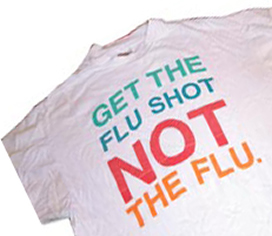QUESTIONS ABOUT FLU SHOTS? ......We all know the symptoms of flu, fever, runny nose, cough, watery eyes, sore throat and muscle fatigue. These symptoms usually last three to five days but can last more if the flu is complicated, which can cause severe respiratory infections. The best way to prevent the flu is to be vaccinated against influenza (influenza vaccine) every autumn before the start of flu season.
ARE YOU IN THE LIST? |
|
| ....Why to get the flu shot? | |
The best way to prevent the flu is to get an annual flu shot. Plus... ....THE FLU IS SERIOUS --> Influenza (commonly called the flu) is not just a runny nose or upset stomach. It is a serious illness that can lead to pneumonia. At least 45,000 Americans die each year from influenza and pneumonia, the sixth leading cause of death in the United States. 90 percent of these deaths are among people 65 years of age or over. ....THE FLU CAN BE VERY DANGEROUS FOR PEOPLE 50 AND OLDER ---> People 50 years of age or over should get a flu shot, unless they are allergic to eggs. It's also important for those with a chronic illness, and for those who spend a lot of time around sick or elderly people. ....A FLU SHOT IS SAFE AND HELPS YOU PROTECT OTHERS ---> Flu shots are safe and effective. And when you get a flu shot you help yourself and those around you. By avoiding the flu, you avoid giving it to friends and family. ....THE FLU CAN MAKE YOU BLUE ---> Even if you don't develop serious problems, the flu can make you feel bad for days. It can cause fever, chills, headache, cough and sore muscles.
|
|
| ....When is the best time to get the flu shot? | |
|
|
| ....Why do children need two doses of the flu vaccine? | |
Children younger than 9 years old require two doses of the flu vaccine if it's the first time they've been vaccinated for influenza. That's because children don't develop an adequate antibody level the first time they get the vaccine. Antibodies help fight the virus if it enters your child's system. If a flu vaccine shortage was to occur and your child couldn't get two doses of vaccine, one dose might still offer some protection.
|
|
| ....Why do I need to get vaccinated every year? | |
Influenza (flu) viruses mutate so quickly that they can render one season's vaccine ineffective. You need annual flu protection because the influenza virus changes from year to year. The flu vaccine you got last year wasn't designed to fight the virus strains in circulation this flu season.
|
|
| ....Is it worth getting the flu shot if you're over 65? | |
Even the persons over 65 years, produce fewer antibodies in response to the virus, it is very important to get the flu vaccine to decrease the risk of flu-related complications.The older adults are especially vulnerable of influenza, also vulnerable to pneumonia, and when there is a history of myocardial infarction, stroke, the flu-related complications can be fatal.
|
|
| ....Can the flu shot give me the flu? | |
No, the flu shot cannot cause flu illness. The influenza viruses contained in the flu vaccine are each inactivated (killed), which means they cannot cause infection. Flu vaccine manufacturers kill the viruses used in the vaccine during the process of making vaccine, and batches of flu vaccine are tested to make sure they are safe.
|
|
| ....The flu shot will save me from getting the flu? | |
In most years, influenza vaccine has prevented 70 to 90 percent of people who is healthy, younger and older than 65 years, who have been vaccinated. In some cases, people contracted other diseases that have symptoms similar to those of flu, and on other occasions, people who get a flu shot can still get the flu, but they may get a much less severe form of the illness and, most important, they'll have a decreased risk of flu-related complications.
|
|
| ....What are the options for the flu vaccine? | |
The flu vaccine comes in two forms: • A nasal spray. Administered through the nose, the nasal spray vaccine (FluMist) consists of a low dose of live, but weakened, flu viruses. The vaccine doesn't cause the flu, but it does prompt an immune response in your nose and upper airways as well as throughout your body.
|
|
| ....If I've already had the flu, can I get it again? | |
You can have a flu shot depending on how long ago you got the flu. Once you've had the flu, you develop antibodies to the viral strain that caused it. But those antibodies won't protect you from new or mutated strains of influenza or other viruses.
|
|
| ....Who should NOT get the flu shot? | |
Don't get a flu shot if you:
|
|
| ....Will Medicare pay for my flu shot every year? | |
Medicare will pay for the flu shot once every flu season. In some cases this may mean twice in one year. For example, if you received a shot in January 2008 for one flu season, you could be inoculated again in October 2008 for another flu season. Medicare Part B also pays for the pneumococcal vaccination. Ask your health care provider about both of these vaccines. For more information please visit www.Medicare.gov
|
|
| .....FLU SHOTS ARE AVAILABLE!!! | |
.......From September 30th The County of San Diego Flu Shots Hotline, (877) FLU-0202, is staffed to give seniors and others information about where to receive an influenza vaccine near them. Medicare (Part B) will pay for the flu shot as well as a vaccine to prevent pneumonia. The influenza season typically occurs between November and May each year. The influenza vaccine is recommended annually for people age 60 and older, as well as younger people with chronic medical conditions. Influenza vaccine manufacturers are reporting that there will be plenty of vaccine available for this year’s flu season and shipments have already begun. You can get more information on the Web site www.sdchip.org. to locate flu shot sites.
|
|
|
|
TEL- 619-427-4111 Email - Health@infooption.com Salud+HealthInfo is for information and educational purposes only. You should not rely on this information as a substitute for personal medical attention, diagnosis or hands-on treatment. If you are concerned abut your health or that of a child, please consult your family's physician or health provider immediately and do not try to diagnose yourself. Copyright © 2001-2008 Info Option Network |
|
Bienvenido a la primer revista dedicada al cuidado de la salud
 info
info
The first, the best & the only English & Spanish Magazine in San Diego, California
 |
|
| Questions About Flu Shots? | |
| Flu Vaccine Recommended for Everyone | |
| FLU Season | |
| Kids Are In Danger With Cough and Cold Medications | |
| Pandemic Influenza | |
| Tuberculosis | |
|
|
| More information related | |
| ..Immunizations | |
| How to Lower the Medications Cost | |
| Medication to Quit Smoking | |
| All Adviced to carry health info | |
| Seeking Health Statistics? | |
|
|
| Health Insurance | |
| If you are a health care provider who bills for services, you probably need an NPI. Do you have your NPI? | |
| Fraud Scam to Medicare | |
| Prescriptions and insurance plans | |
| About the Universal Health Insurance Coverage in California | |
|
|
| County of San DiegoHealth and Human Services, HHS | |
| Aging & Independence Services | |
| Alcohol and Drug Services | |
| County of San Diego Emergency | |
| Housing Commission | |
| Mental Health Services | |
| Tobacco Control | |
| Vector Control Program | |
|
|
|

